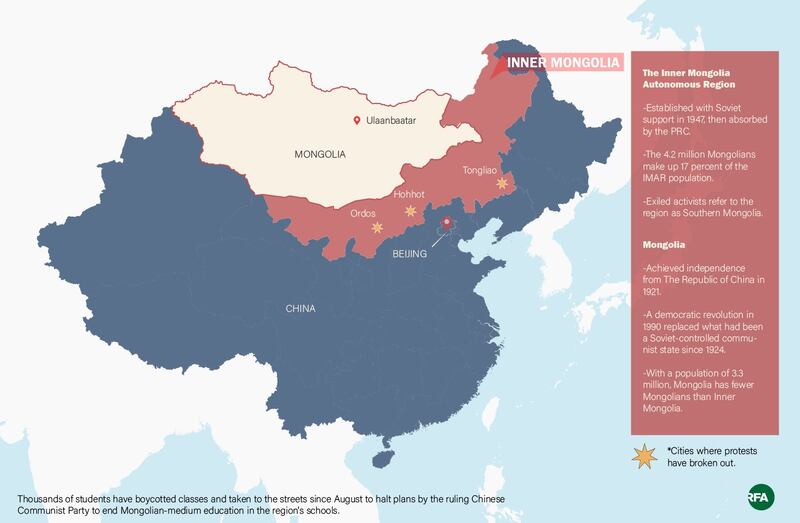Schools and classrooms remained largely empty across the northern Chinese region of Inner Mongolia on Thursday, amid an ongoing civil disobedience movement protesting plans to end Mongolian-medium teaching in the region's schools.
Police began a region-wide operation seeking the leaders of protests and the organizers of school boycotts among the region's 4.2 million ethnic Mongolians.
Police in Xing'an League and Ulanhot city were meanwhile out looking for school-age ethnic Mongolian children to force them back into school.
Japan-based ethnic Mongolian scholar Khubis said high-school students in Shiliin-Gol League had begun a hunger strike over the plan to end first-grade classes in the Mongolian language.
“Four students in the third grade of a Mongolian-medium high school in Xilin Gol went on hunger strike [on Sept. 1] to protest the new Chinese language education policy," Khubis told RFA.
"More than 300 ethnic Mongolian employees of the state-run Inner Mongolia Radio Station signed a petition saying that they could not accept the new Chinese-medium education policy," he said.
New editions of Mongolian-language textbooks were found to have had chapters on Mongolians' pride in their homelands and love of their language deleted, while sections in Chinese had been added to the text, Khubis said.
Meanwhile, authorities in Urad Middle Banner -- a county-like division -- put out urgent directives ordering all ethnic Mongolian civil servants or public employees to return their children to schools by Sept. 2, or face immediate firing and disciplinary action.
Ethnic Mongolian herders said they had seen large numbers of armored personnel carriers on the streets in some areas, while the local government is saying that the protests were "incited by overseas forces."
And ethnic Mongolian academic Arichaa said roadblocks have been set up at borders between banners and cities.
"Many roads between banners and counties have been blocked since Sept. 2," Arichaa said. "At the border between Naiman and Kulun, there have been clashes between parents and police."
Social media shut down
A mass social media shutdown had made it harder for parents and teachers to coordinate their actions, Arichaa said.
"Parents and teachers cannot communicate via phone calls, or WeChat," Arichaa said, adding that at least two people had reportedly been detained on suspicion of "picking quarrels and stirring up trouble," a charge often used to target peaceful critics of the ruling Chinese Communist Party.
On Sept. 2, police in Kezuohou Banner issued a notice calling on nine people involved in recent protests and class boycotts in Ganqika, Agula, Hailut and Gilgalang townships to turn themselves in.
Anyone with information leading to their detention is offered a 1,000 yuan reward.
Across the border in the independent country of Mongolia, scholar Chimag said academics had organized a protest in the capital, Ulaanbaatar, outside the Chinese embassy.
"They were hoping that the Chinese government would reconsider the policy it has started implementing, and restore the old system," Chimag said.
Ethnic Mongolian parents from across the region have continued to send video clips to the New York-based Southern Mongolian Human Rights Information Center (SMHRIC).
The group estimated that, on the first day of the new semester on Sept. 1, around 300,000 ethnic Mongolian students had joined the boycott.
It said more than 100 people have been listed as wanted by police in Horchin district of Tongliao city, Zaruud Banner, Naiman Banner, Tongliao Development Zone, Horchin Left Wing Middle Banner, and Horchin Left Wing Rear Banner.
The posters accuse the people on the list as being suspected of "picking quarrels and stirring up trouble," it said.
It said reports had emerged that at least two Mongolian parents have committed suicide in protest at the authorities’ extreme pressure to send their children to school.
"One is a mother and teacher from the Shuluun-huh Banner in Shilin-gol League," SMHRIC said.
"The other, a father whose wife is a teacher, was forced to send his child to school under tremendous pressure from the authorities in Tongliao."

Degrading cultural identity
In New York, PEN America said the new education policy "threatens to degrade ethnic Mongolians’ language rights and cultural identity."
It said the policy, which went into effect this week, would remove Mongolian-language instruction for several key subjects.
"PEN America is concerned that the new policy ties into larger governmental efforts to push the assimilation of ethnic minorities at the expense of their ability to express their cultural identities," the group said in a statement.
"This new policy flies in the face of its own commitments under both domestic and international law, to listen to the concerns of Inner Mongolian citizens, and we call on the Chinese government to reverse the policy and re-commit to the observance of minority language rights," James Tager, deputy director of free expression research and policy at PEN America, said in the statement.
The group pointed to widespread censorship of news of the protests, with the government shutting down Bainuu, a Mongolian-language social network that once boasted more than 400,000 users.
"By responding with censorship of their social media posts and targeting of peaceful protesters, the government is only further erasing their voice," Tager said.
China’s constitution, as well as its Regional Ethnic Autonomy Law, explicitly protect the linguistic rights of ethnic minorities, including guarantees of the freedom of ethnic nationalities to use their own spoken and written language, PEN America said.
It said China also has commitments under international law to safeguard minority language rights, including through articles 29(c) and 30 of the Convention of the Rights of the Child, and article 27 of the International Covenant on Civil and Political Rights, both of which have China as a signatory.
Reported by Qiao Long for RFA's Mandarin Service. Translated and edited by Luisetta Mudie.
